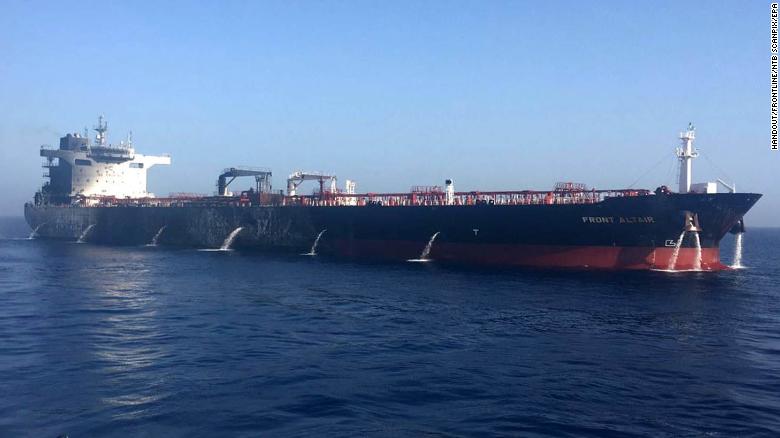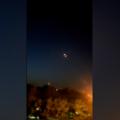Our live coverage has concluded. Read more about the vessel attacks in the Gulf of Oman here.
Gulf of Oman tankers attacked
By Eliza Mackintosh, Helen Regan and Vasco Cotovio, CNN
US Central Command says interference with USS Bainbridge in Gulf Oman will not be tolerated
From CNN's Barbara Starr
The US military said that the USS Bainbridge remains in contact with one of the vessels attacked this morning and "is the on-scene US command authority.”
“No interference with USS Bainbridge, or its mission, will be tolerated,” Lt. Col. Earl Brown, a spokesperson for US Central Command, said in a statement today.
A US official told CNN that multiple small Iranian boats have entered the area and the US is monitoring their activity.
The USS Mason is headed to the scene to provide additional assistance.
Read the rest of the statement:
“The US and our partners in the region will take all necessary measures to defend ourselves and our interests. Today's attacks are a clear threat to international freedom of navigation and freedom of commerce. The US and the international community stand ready to defend our interests, including freedom of navigation. This is a threat to maritime shipping and international commerce.
The US and our regional partners are assisting in the response to attacks in the Gulf of Oman. The US and the international community, stand ready to defend our interests, including freedom of navigation.
We have no interest in engaging in a new conflict in the Middle East. We will defend our interests, but a war with Iran is not in our strategic interest, nor in the best interest of the international community."
UN Security Council privately discusses oil tanker attacks
From CNN's Richard Roth
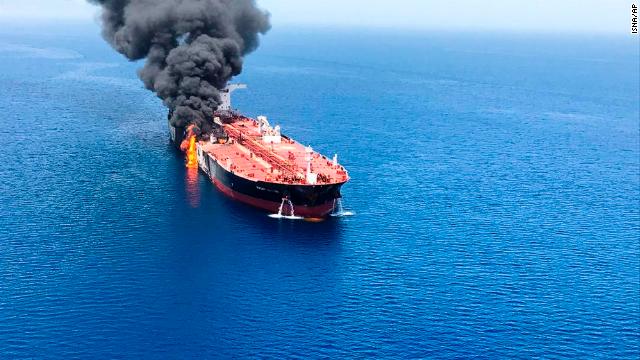
The United Nations Security Council today privately discussed the latest oil tanker attacks in the Middle East, but declined to produce any formal reaction.
Kuwait’s UN Ambassador Mansour al-Otaibi said his country was pleased the topic was discussed. He said no country produced any evidence that might point the finger at those responsible.
The acting US Ambassador Jonathan Cohen, echoed much of US Secretary of State Mike Pompeo’s earlier comments in Washington, blaming Iran for the attack in an attempt to destabilize the region. Cohen repeated his earlier comment to an open council session in the morning calling the attacks "unacceptable."
“Iran should meet us with diplomacy, not with terror attacks on ships, infrastructure and diplomatic facilities,” Cohen added.
Cohen said he expected further conversations on the blasts in coming days.
The US blamed Iran for the attacks today. Here's what Iran has said about them.
US Secretary of State Mike Pompeo said Iran is responsible for today's attacks on two tankers in the Gulf of Oman.
He said the the United States government is drawing this conclusion based on "on intelligence, the weapons used, the level of expertise needed to execute the operation" — but he did not offer any concrete evidence to support the claim.
National Security Adviser John Bolton earlier today also spoke out to put responsibility on Iran, but also did not offer evidence.
Here's what Iran has said about the attacks: Iranian Foreign Minister Mohammad Javad Zarif noted that one of the ships is Japanese owned and that the attack took place as Japanese Prime Minister Shinzo Abe was visiting Iran. He called the attack "suspicious" in a tweet.
"Reported attacks on Japan-related tankers occurred while PM [Shinzo Abe] was meeting with Ayatollah [Khamenei] for extensive and friendly talks. Suspicious doesn't begin to describe what likely transpired this morning," Zarif tweeted.
Meanwhile, Russia has cautioned against "hasty statements" over the attack, with a spokesperson for the Kremlin saying it was premature to draw conclusions about the cause of the incident.
Mike Pompeo: Iran is responsible for attacks on tankers in Gulf of Oman today
From CNN's Jennifer Hansler
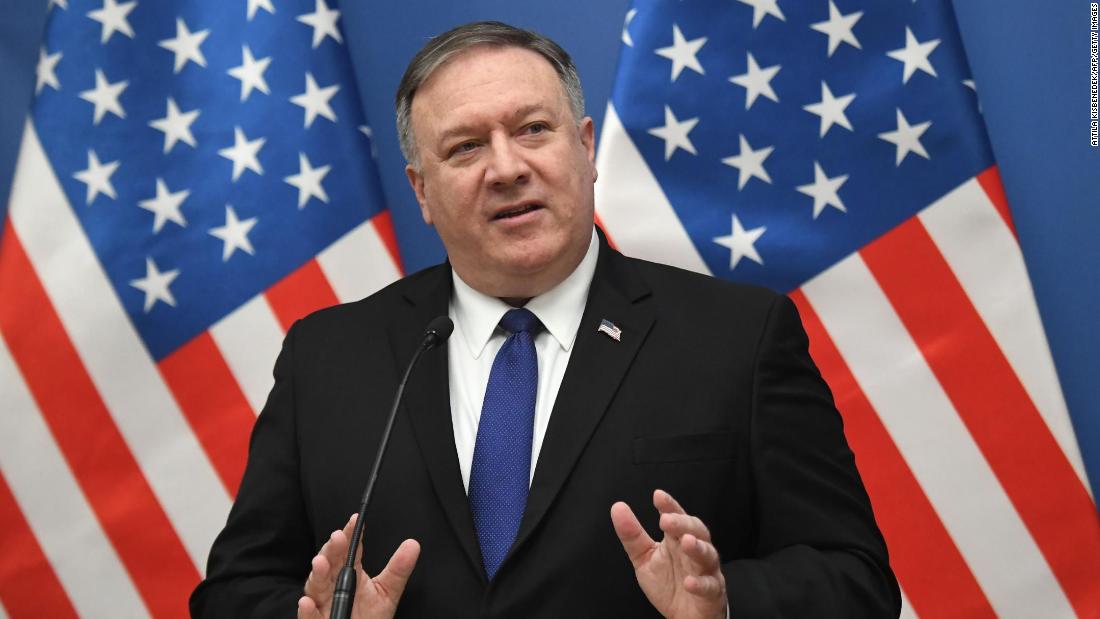
US Secretary of State Mike Pompeo blamed Iran for an attack on two tankers in the Gulf of Oman, saying the assessment was based on intelligence, but offered no evidence to support his claim.
“It is the assessment by the United States government that the Islamic Republic of Iran is responsible for the attacks that occurred in the Gulf of Oman today," Pompeo told reporters at the US State Department.
He continued:
"This assessment is based on intelligence, the weapons used, the level of expertise needed to execute the operation, recent similar Iranian attacks on shipping, and the fact that no proxy group operating in the area has the resources and proficiency to act with such a high degree of sophistication."
Attack was "well-planned and coordinated," tanker owners' association says
From CNN’s Vasco Cotovio
The two tankers attacked in the Gulf of Oman this morning were both hit "at or below the waterline, in close proximity to the engine room while underway," according to the International Association of Independent Tanker Owners (Intertanko).
"These appeared to be well-planned and coordinated," Intertanko said.
US Navy spotted an unexploded mine attached to one of the attacked ships, official says
From CNN's Barbara Starr
The crew of USS Bainbridge reported that they saw an unexploded limpet mine on the side of one of the ships attacked today in the Gulf of Oman, according to a US defense official familiar with the matter.
What that means: A limpet mine is type of a mine that is attached to side of a hull using magnets.
Limpet mines were also suspected d to be used in the May attack on four oil tankers off the coast of the United Arab Emirates. The UAE concluded that a "state actor" is the most likely culprit and chemical analysis of the debris recovered in May revealed "it was highly likely that limpet mines' were deployed."
What happens now: Additional US navy ships are expected to head to the area in the coming hours for security, patrolling, helping mariners get back to port and potentially assist in arranging for tankers to be towed to port, the source said.
Satellite image appears to show smoke rising from oil tanker after attack
From CNN's Paul P. Murphy
CNN has obtained a satellite image that appears to show smoke rising from the Front Altair tanker after it was damaged in the Gulf of Oman attack.
The strong glint on the water is caused by light reflecting.
Take a look:
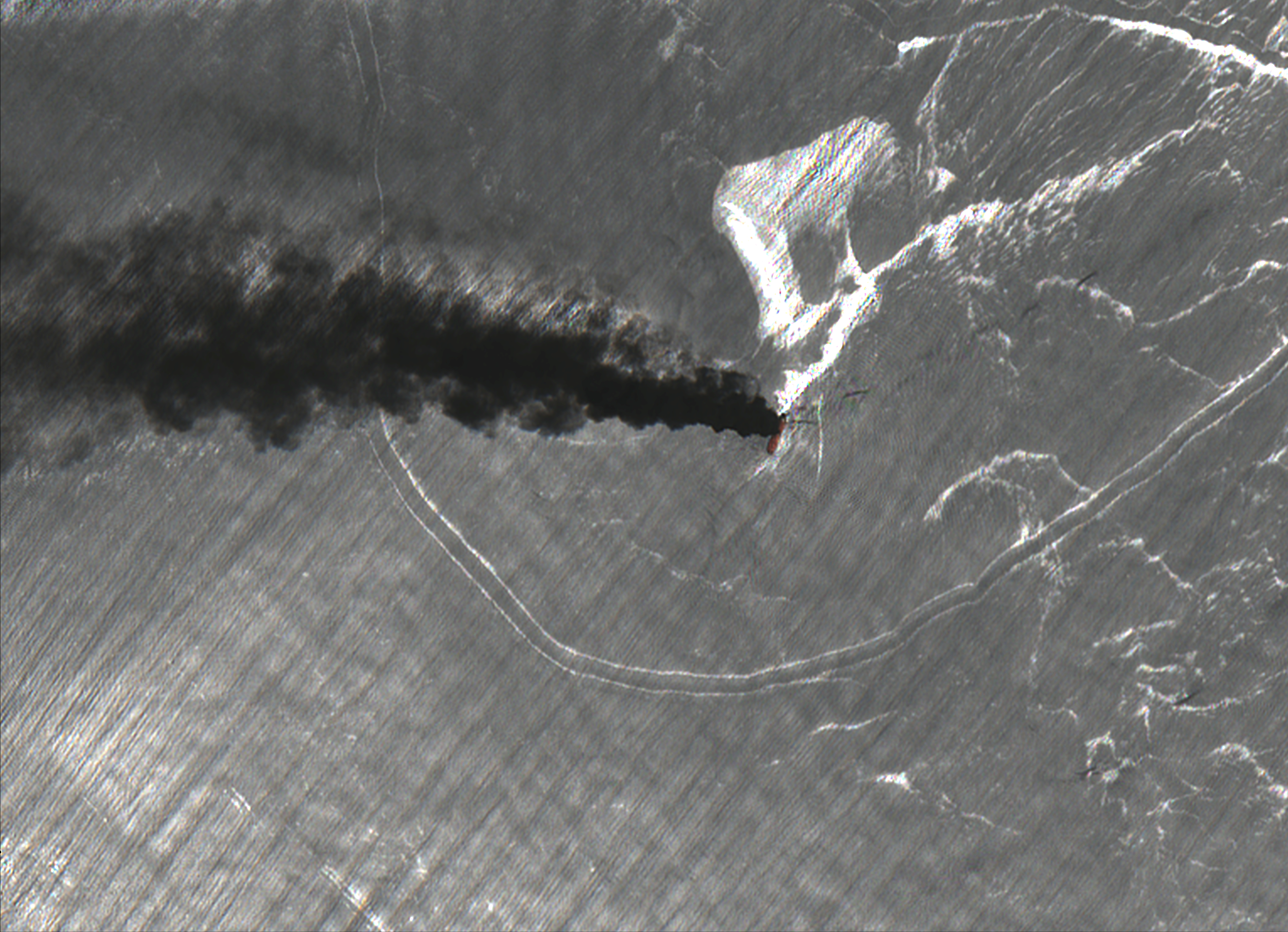
Photos show damaged oil tanker Front Altair in the Gulf of Oman
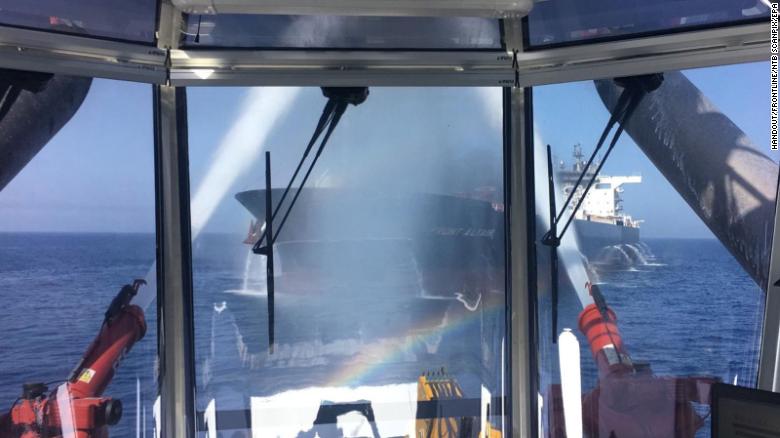
The Front Altair oil tanker was one of two ships that were apparently attacked in the Gulf of Oman Thursday.
The Norwegian Maritime Agency said that three explosions were reported on board the Marshall Islands-flagged Front Altair oil tanker, which is owned by the Bermuda-based Norwegian company Frontline. The company said that a fire broke out after an explosion and that the cause of the blast was unclear.
Here's a look at the damage on Frontline's oil tanker:
